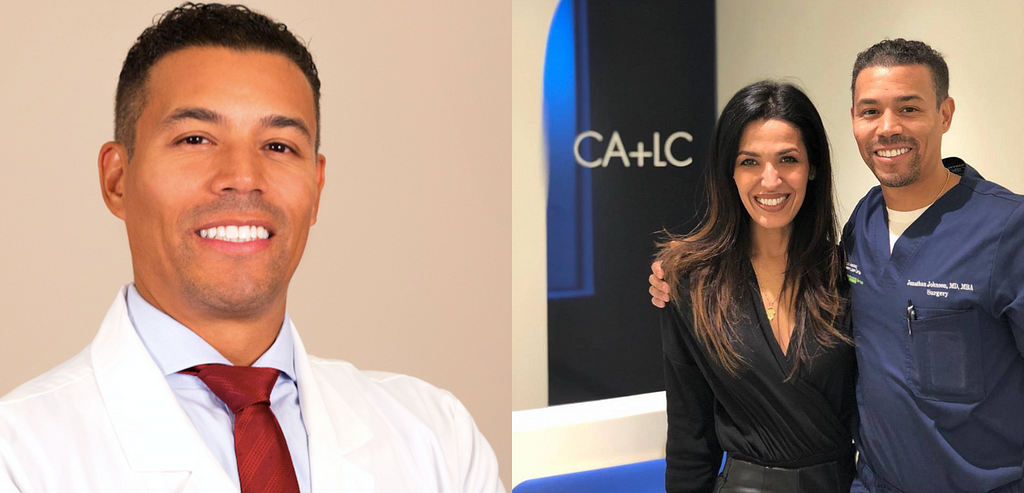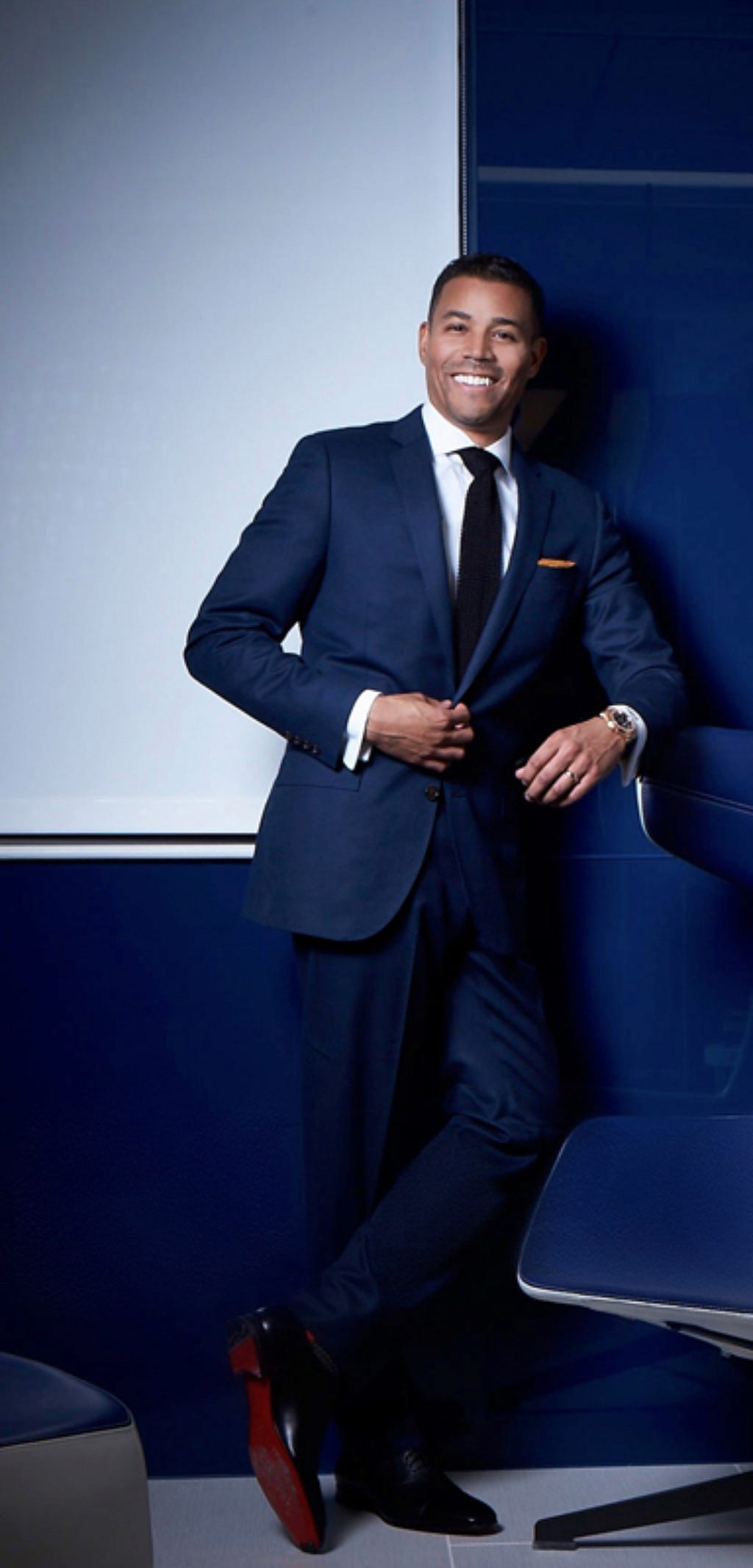Dr. Jonathan Johnson, Dr. Wounds: Why it is essential for doctors to treat the entire patient, listen to their concerns, & ask about their daily routines

…treat the entire patient, listen to their concerns, ask them about their daily routines and understand how they feel because the keys to improvement and restoring self-care and confidence are in their words.
As a part of our series about how technology will be changing the beauty industry over the next five years, I had the pleasure of interviewing Dr. Jonathan Johnson.
Dr. Jonathan Johnson, MD, MBA, CWSP, also known as Dr. Wounds, is an award-winning physician and is one of the nation’s leading specialists in wound care and aesthetic procedures. Dr. Wounds is the founder and surgical director of Comprehensive Wound Care Services and Capital Aesthetic & Laser Center, and his unrivaled work has earned him numerous accolades as a lecturer and industry leader in research.
As a leader at the forefront of medical innovation, Dr. Wounds expanded his scope of wound care services in 2020 to provide full-scale Tele-wound care services for all client cases, and continually develops ultramodern solutions that provide all-inclusive, high-quality care to patients worldwide. Outside of his critical medical work, Dr. Wounds is a member of Alpha Phi Alpha Fraternity Incorporated, is a board member of the Capital Youth Empowerment Program, and uses his platforms to promote health awareness and education in underserved communities.
Dr. Wounds resides with his wife Crystal and daughters Isabella and Liliana in Potomac, Maryland.
Thank you so much for doing this with us! Before we dive in, our readers would love to learn a bit more about you. Can you tell us a story about what brought you to this specific career path?
I’ve always been excited and interested in the aesthetic medical services because I believe our best self inspires self-confidence, ambition, and external presence. I trained in surgery after medical school and became engrossed in the subspecialties of wound care reconstruction and aesthetic procedures. Through research, education lectures, and extensive training, I fell in love with helping patients achieve their best self aesthetically and heal physical, non-healing wounds. Through my fellowship in New York, I honed my surgical and clinical skills in patient care but also focused on treating the entire patient. I understood that physical self-confidence leads to inner confidence. Growing up in Colorado, I was blessed to see my parents run a successful dental practice. I established a lawn mowing business in my neighborhood and one of my customers was an orthopedic surgeon. We connected and as a middle schooler I observed surgical procedures in the summer which intensified my love for surgery.
Can you share the most interesting story that happened to you since you began your career?
The interesting stories are successful stories of patients healing after extensive wounds and crying in my office care because we were able to heal their leg wound that prevented them from getting in the pool in the summer. From our aesthetic practice, it’s the patients who can’t look you in the eyes due to shyness shame of a body defect, that blossom once we treat them. There are many interesting stores, but one comes to mind is of a patient with sacral wound defect that wanted to attend his daughter’s wedding and walk her down the aisle without a wheelchair. We healed his wound and he was able to comfortably participate in, as he recalled, “one of the happiest days of my life.” As many patients do, he sent us a thank you letter and a picture. Our motto is “We Heal Wounds.”
Are you able to identify a “tipping point” in your career when you started to see success? Did you start doing anything different? Are there takeaways or lessons that others can learn from that?
The tipping point aesthetically and on the wound care side was using multiple modalities to treat clinical defects. We use customized patient treatments we’ve developed over the years via research to provide the best outcome. Our takeaway lessons are: treat the entire patient, listen to their concerns, ask them about their daily routines and understand how they feel because the keys to improvement and restoring self-care and confidence are in their words.
None of us are able to achieve success without some help along the way. Is there a particular person to whom you are grateful who helped get you to where you are? Can you share a story about that?
I’m grateful for my parents for all of their support and for the orthopedic surgeon I met when I started my lawn mowing business in middle school, who helped me gain exposure to the medical field.
Ok super. Let’s now shift to the main part of our discussion. The beauty industry today has access to technology that was inconceivable only a short time ago. Can you tell us about the “cutting edge” (pardon the pun) technologies that you are working with or introducing? How do you think that will help people?

The clinical aesthetic medicine and wound care cutting-edge treatments have morphed into technology-based combination treatments. In wound care, we use standard practices as determined by the wound characteristics. If the wound is infected, we use dressings and treatments that reduce infection. If the wound is too dry or if there’s increased exudate, we treat accordingly. In addition, we focus on post scar treatments such as silicon gels and laser therapies to improve appearance. Aesthetically, the industry is changing daily, but combination therapies are still at the forefront. New dermal fillers and neuromodulators with radio frequency laser treatments are used in combination depending on the clinical defect.
Keeping “Black Mirror” and the “Law of Unintended Consequences” in mind, can you see any potential drawbacks about this technology that people should think more deeply about?
Overuse in any of these combinations and treatments by untrained and or undertrained non-medical personnel (Aesthetically Board-Certified Physicians) are the major drawbacks. Remember to research the providers that are treating you to make sure they are certified and properly trained. Innovation and research are always changing in the aesthetics and wound care, therefore, your provider should be well versed with continued medical education.
Can you share 3 things that most excite you about the “beauty-tech” industry?
Three things that excite me most about the beauty-tech industry are:
- Increased access to patient care and virtual consultations which our practice offers on the wound care and aesthetic side.
- Direct to consumer products after virtual consultations which our practice offers on the wound care and aesthetic side (skin health).
- Clinical tech platforms that enable consistent interaction with the patient. Our practice uses aesthetic records and a tele-wound care based system called Doxy.me to establish and manage our Dr. Wounds teleconsultation platform.
Can you share 3 things that most concern you about the industry? If you had the ability to implement 3 ways to reform or improve the industry, what would you suggest?
With the new COVID-19 restrictions, we have been able to implement the above which should reach more patients for effective care models. My concern from an aesthetic standpoint is non-medically trained or under-medically trained providers are marketing aesthetic services which can cause detrimental, long-term negative effects.
You are an expert about beauty. Can you share 5 ideas that anyone can use “to feel beautiful”? (Please share a story or example for each.)
Beside the basic aesthetic beauty concepts, i.e., diet, exercise, sunscreen, night treatments, etc., our practice focus on the concepts below with our patients:
1. Self-confidence — Being true to yourself and loving who you are inside and out. This is the first inner concept we discuss with and understand about our patients.
2. Self-Care — Understanding that the foundation of your inner and outer beauty/health is how to take care of yourself long and short term. This ranges from diet to your daily skin care routine.
3. Mental inventory — Meditation or mental breaks to re-calibrate your inner self are key to your foundational health.
4. Establish a quality relationship with your health care providers — Simply visit your doctor and dentist regularly for checkups, because health is your greatest wealth.
5. Stay engaged socially — Building relations and maintaining relationship establishes and reinforces self-assurance which can promote beauty inside and out.
You are a person of great influence. If you could inspire a movement that would bring the most amount of good to the most amount of people, what would that be? You never know what your idea can trigger. 🙂
An all-inclusive approach to clinical aesthetic and wound care as per above. A comprehensive approach to patient care is what sets our practice components apart from others.
Can you please give us your favorite “Life Lesson Quote”? Can you share how that was relevant to you in your life?
“Do not fear failure but rather fear not trying” and “Health is wealth.”
Personally, I’m passionate about innovation and impacting society and those around me positively. Live life because it’s short. Take care of yourself and your family because that is the true wealth.
How can our readers follow you online?
You can visit us online at www.cwswounds.com and www.capitalaestheticdc.com. You can also connect with us on social media:
Doctor Wounds (@DoctorWounds)
www.instagram.com/doctorwounds
Capital Aesthetic (@CapitalAestheticDC)
www.facebook.com/CapitalAestheticDC
www.instagram.com/capitalaestheticdc
Thank you so much for joining us. This was very inspirational.
Dr. Jonathan Johnson, Dr Wounds: Why it is essential for doctors to treat the entire patient, liste was originally published in Authority Magazine on Medium, where people are continuing the conversation by highlighting and responding to this story.
